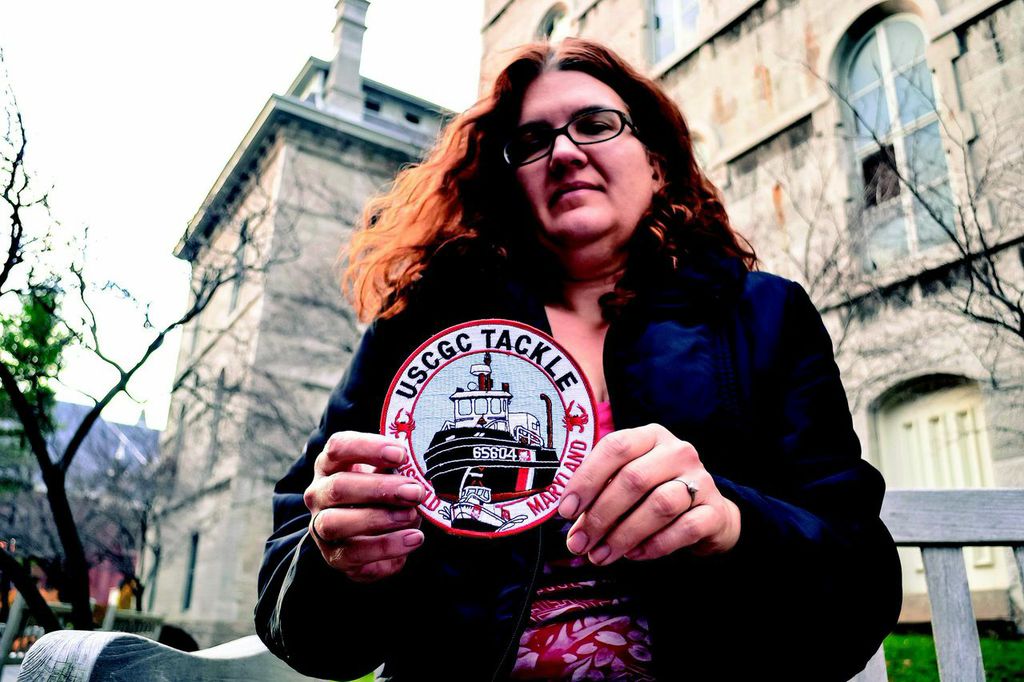No Solider Left Behind
By Jill Comoletti + Photo by Chaz Delgado
When Jen Jeffery arrived at the Coast Guard station in Clearwater, Florida, people were already whispering her name. She’s a single mother. She’ll be a piece of shit. She won’t have time to do anything. Jeffery, who anticipated this type of attitude from her fellow guards, fought to prove them wrong. Eventually, she did. She qualified for boat crew and engineer positions, as well as for Officer of the Day. She shocked the other guards at the base with her success, but it didn’t come without sacrifice.
“I couldn’t appear to be a mother. I always had to appear to be something I was not, and I constantly battled with that. Being authentic is very important to me,” says Jeffery, who served in the Coast Guard for seven years and one month. This struggle with identity put Jeffery in a moral bind. The Syracuse Veterans’ Writing Group provides an environment for her to deal with these past emotions.
Eileen Schell, a writing professor at Syracuse University, founded the Syracuse Veterans’ Writing Group in 2010 as a living memorial to her uncle, Brady Lane Smith, who served in Vietnam. Smith suffered from injuries and post-traumatic stress disorder after returning from war. He passed away at 68 years old. Through it all, he remained a great storyteller. Schell met many veterans at SU who struggled to find an outlet for expressing themselves; she started the writing group as a safe place for them to share their stories.
The Syracuse Veterans’ Writing Group meets once a month in the SU Writing Center and welcomes SU students, faculty, and members of the surrounding community. There are 16 to 20 regular attendees who range from Korean War to Afghanistan war veterans. Several family members also participate in honor of loved ones.
Jeffery realized writing could help her work through her past after taking a creative nonfiction class at SU. In the class, she found herself writing about one of her darker experiences as a member of the Coast Guard. One night, when Jeffery was stationed in Florida, a 16-year-old girl training for the Navy was raped after her roommate took her out of the station, breaking the rules. Because she was Officer of the Day at the time, Jeffery had to handle the situation. She had warned everyone that the roommate was a bad influence, but no one listened. She always felt she should have pushed harder to make sure the two weren’t rooming together. Writing about this experience proved difficult, so she took her story to the Syracuse Veterans’ Writing Group in March 2013. She has been a habitual attendee ever since.
Jeffery most enjoys when her stories help other group members feel comfortable enough to share their experiences. She wrote a poem called “I Sat with the Dark This Morning,” which speaks to facing one’s dark side and coming to terms with it, and shared it with the group. One male veteran in the workshop hesitated to share his work, fearing it was too dark. “After I read my poem, he said, ‘I think I can read my poem now.’ And I was just like, ‘Wow. That is awesome,’” Jeffery says. “That’s why you keep going back.”
Andrew Miller, a former company fire support officer and aviation squadron intelligence officer in the U.S. Army, also decided to attend the group after taking a creative nonfiction class at SU. For Miller, writing about his experiences is like facing all of the dirt that gets swept under the rug—sometimes when you sweep that dirt up, life gets worse before it gets better. “Writing can be hard. Really hard. It’s like the stock market. It goes up and down all the time and you have bad days,” Miller says. “I suppose you could say it’s because you’re writing about this horrible thing that’s been really unsettling for you, but ultimately that’s how you get through it.”
Writing about the war has been life-changing for Pete McShane, a Vietnam veteran who served as a U.S. Army Special Forces medic. Upon returning from Vietnam, McShane had a hard time transitioning back to civilian life. After his bankruptcy and divorce, he reached his lowest point. It wasn’t until McShane attended a Special Forces reunion in 2005 that he realized the root of his problems. “There was a room full of broken men, and they were the only people in the world that I could trust,” he says. After this realization, McShane had a nervous breakdown. He turned to writing as a method of healing.
In 2011, after taking courses and workshops at the Syracuse YMCA’s Downtown Writing Center for eight years, McShane began attending the Syracuse Veterans’ Writing Group. Some of his most rewarding moments in the group come from helping others realize they aren’t alone. “When I read my writing in front of other vets—particularly younger folks who were just back from the war and their heads were spinning—it has helped them stop thatspinning,”he says. He recently finished his 130,000-word memoir, and is currently editing an anthology of work by members of the Syracuse Veterans’ Writing Group with co-founder Ivy Kleinbart.
Like McShane, Miller is thankful that the writing group provides this for veterans. "There's something really special about a space with just vets and caregivers working on writ in together," Miller says. "At some point I realized I wouldn't know what to do with myself if I didn't have this."
Read some of veterans' work:
An Ugly Place by Andrew Miller
I Sat with the Dark This Morning by Jennifer Jeffery
This story originally appeared in the December 2014 issue of Jerk.


